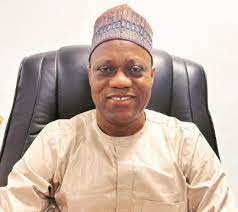The Statistician-General of the Federation and Chief Executive Officer of the National Bureau of Statistics (NBS), Prince Adeyemi Adeniran, has appealed to state governments that are yet to legalize their statistics offices through enabling legislation to do so in view of the implications for a more robust statistical system for the country.
Adeniran gave the charge in his keynote address during the opening of the 2nd Session of the Bi-Annual Meeting of the National Consultative Committee of Statistics (NCCS) with theme ‘Enhancing Data Integration and Interoperability within the Nigerian Statistical System’ held on Wednesday in Asaba, Delta State.
While recalling the sustained efforts by the NBS and its supporting development partners and the Federal Government to holistically transform the Nigerian statistical system over the past few years, the Statistician-General noted that though much had been achieved in the drive but that there remained areas to be focused on to fully integrate the national and sub-national governments’ data to effectively guide policy formulation for national development.
For instance, he spoke on the issues of the Integrated System of Administrative Statistics (ISAS) and the State Gross Domestic Product (SGDP) as among the activities that would be presented and discussed in detail at the meeting, which not only relate to the theme for the session but that when fully implemented, they will have an immense impact in driving the progress of the system.
According to him, the operationalisation of the ISAS and the SGDP projects holds significant prospects for the nation’s statistical system.
Adeniran explained that the ISAS uses the instrumentality of technology to facilitate seamless collation, validation, analysis, and reporting of administrative data straight from the source, that is, from the relevant Ministry Department or Agencies (MDAs) of government where the data is being recorded, straight to the Bureau from where it will be disseminated.
With administrative sources of data being the largest source of statistical information compared to surveys, he maintained that it had become imperative that the national and sub-national statistics agencies continue to enhance the system and make it fit for future needs.
On State-level GDP, which he mentioned as the second activity for the meeting that equally held great significance for both the states and the wider statistics system in Nigeria, the NBS’ CEO lamented that this remained one data point that NBS or states had not been able to sufficiently provide for national data users.
He recalled that aside from individual attempts by several states to which NBS had always provided support, there was a collective process carried out in collaboration with United Nations Development Programme (UNDP) and the Ministry of Budget and Economic Planning in the past that produced State GDP for 22 states.
Adeniran stressed that under this new effort, the NBS would want to ensure that every state in the country remained fully captured and on board, hinting that going by the statistics agency’s plan, which will be implemented with the states, GDP will be produced for all the states and each one would have their capacity developed in the process.
While noting that data production is tasking, especially in a developing environment like Nigeria, he maintained that the privilege of carrying out such a vital service for the country represented an honour and a great opportunity, so the NBS and states’ statistics agencies must not fail on the job as every chance must be seized to show that the agencies are equal to the task, and that the trust reposed on the managements by the government and Nigerians is not in vain.
Adeniran, promised that as usual, the NBS would continue to play its role as the coordinator of the system to support all members to live up to their mandate of producing timely and reliable information for all our users as well as continue to advocate for the passage and establishment of independent state bureaus of statistics across the country, particularly for those states that are yet to pass their laws.
On the enactment of the states’ statistics enabling laws, the Statistician-General said: “The passage of state statistics law and the establishment of the agency with its own budget line in each state is the foundation upon which a viable statistical system can be developed; a system that produces the necessary timely and reliable statistics to meet the demand of users. I, therefore, call on states which are yet to pass their laws or establish their bureaus to kindly do so in the interest of the public development.”
While charging the NCCS’ members to remain professional and strictly adhere to the guidelines and principles of their profession as enshrined in the United Nations fundamental principles of official statistics, Adeniran thanked the government and people of Delta State for their support to the event, and for the warm welcome accorded all the attendees of the meeting.






